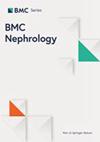溴敌隆可能通过严重的凝血功能紊乱导致严重的急性肾损伤:一份病例报告
IF 2.2
4区 医学
Q2 UROLOGY & NEPHROLOGY
引用次数: 0
摘要
溴敌隆是一种广泛使用的长效抗凝血灭鼠剂,已知会导致严重的凝血功能障碍。目前,还没有关于溴敌隆中毒导致急性肾损伤(AKI)的详细报道。一名 27 岁女性因严重凝血功能障碍和急性肾损伤入院。凝血检查显示凝血酶原时间超过 120 秒,国际标准化比值(INR)大于 10。对凝血因子的进一步检查显示,因子 II、VII、IX 和 X 的水平明显降低,表明患者缺乏维生素 K。急性肾小球肾炎无胆红素尿,以严重的畸形血尿为特征。发病后,患者的血清肌酐从 0.86 升至 6.96 毫克/分升。怀疑是抗凝血剂杀鼠剂中毒,通过气相色谱/质谱法确定血浆中溴敌隆的浓度为 117 纳克/毫升。除了马蹄肾的存在外,所有其他可能导致 AKI 的原因均被排除。在使用大剂量维生素 K 和输注血浆纠正凝血病后,患者的肾功能完全恢复。在出院后 160 天的随访中,凝血功能恢复正常,血清肌酐恢复到 0.51 mg/dL。溴敌隆可通过严重而持久的凝血功能障碍诱发 AKI。使用大剂量维生素 K1 治疗后,肾功能可在数天内恢复。本文章由计算机程序翻译,如有差异,请以英文原文为准。
Bromadiolone may cause severe acute kidney injury through severe disorder of coagulation: a case report
Bromadiolone is a wide-use long-acting anticoagulant rodenticide known to cause severe coagulation dysfunction. At present, there have been no detailed reports of acute kidney injury (AKI) resulting from bromadiolone poisoning. A 27-year-old woman was admitted to the hospital due to severe coagulopathy and severe AKI. Coagulation test revealed a prothrombin time exceeding 120 s and an international normalized ratio (INR) greater than 10. Further examination for coagulation factors showed significantly reduced level of factors II, VII, IX and X, indicating a vitamin K deficiency. The AKI was non-oliguric and characterized by gross dysmorphic hematuria. Following the onset of the disease, the patient’s serum creatinine rose from 0.86 to 6.96 mg/dL. Suspecting anticoagulant rodenticide poisoning, plasma bromadiolone was identified at a concentration of 117 ng/mL via gas chromatography/mass spectrometry. All other potential causes of AKI were excluded, except for the presence of a horseshoe kidney. The patient’s kidney function fully recovered after the coagulopathy was corrected with high doses of vitamin K and plasma transfusion. At a follow-up 160 days post-discharge, the coagulation function had normalized, and the serum creatinine had returned to 0.51 mg/dL. Bromadiolone can induce AKI through a severe and prolonged coagulation disorder. Kidney function can be restored within days following treatment with high-dose vitamin K1.
求助全文
通过发布文献求助,成功后即可免费获取论文全文。
去求助
来源期刊

BMC Nephrology
UROLOGY & NEPHROLOGY-
CiteScore
4.30
自引率
0.00%
发文量
375
审稿时长
3-8 weeks
期刊介绍:
BMC Nephrology is an open access journal publishing original peer-reviewed research articles in all aspects of the prevention, diagnosis and management of kidney and associated disorders, as well as related molecular genetics, pathophysiology, and epidemiology.
 求助内容:
求助内容: 应助结果提醒方式:
应助结果提醒方式:


